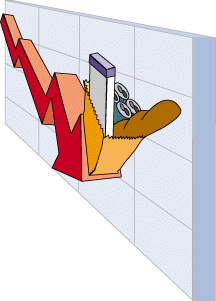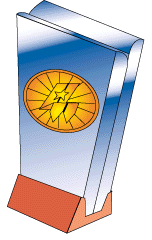Chrysler Requires Suppliers to
Register to TE Supplement In a recent letter, Chrysler Corp. notified its tooling and equipment suppliers that they must become third-party registered to the QS-9000 Tooling and Equipment Supplement. The letter specifies that Chrysler's tooling and equipment suppliers must complete their first self-assessments to the TE Supplement before July 31, 1998. A second self-assessment to the supplement must be completed by all Chrysler TE suppliers before July 30, 1999. By July 31, 2000, all of Chrysler's TE suppliers must be third-party registered to the supplement. The TE Supplement was drafted by a three-person task force -- a subcommittee of the Supplier Quality Requirements Task Force -- consisting of one representative from each of the Big Three. In its current form, the TE Supplement is an advisory document, which prohibits registrars from registering companies to it, says Radley M. Smith, a co-author of QS-9000. This prohibition resulted from General Motors' concern that if they allowed registrars to carry out TE Supplement certification, there wouldn't be enough registrars to certify parts suppliers to ISO 9000 and QS-9000, explains Smith. "A lot of things will have to happen before those suppliers can be third-party registered," says Smith. The first hurdle in the short-term will be publishing and issuing a revised TE Supplement, he notes. The next issue will involve quality registrars training their assessors to carry out audits of suppliers' facilities. General Motors currently has no plans to require its TE suppliers to be third-party registered to the supplement. "General Motors is committed to continuous improvement, and we are looking at the possibility of making the TE Supplement a requirement for certification," asserts Dan Jankowski, spokesman for General Motors. However, at this time, Jankowski says that his company believes such action is premature due to "infrastructure discrepancies." "There's no auditor training at the moment, there's no specific certification body, there are certainly no certification classes," says Jankowski. "Anyone who would try to become certified would not be able to find an auditing group or certification firm capable of qualifying them or certifying them in the first place." Over at Ford Motor Co., the No. 2 automaker also has no plans to require TE suppliers to seek third-party registration to the supplement. Ford's Q1 process already helps the company ensure supplier excellence, maintains Ken Johnson, Ford's supplier technical assistance manager for facilities, materials and services purchasing. The Q1 process requires suppliers to become, among other things, ISO 9000-registered and to institute a quality operating system in their processes. "The TE Supplement, at this point, is just a requirement that suppliers have to be aware of, and it includes certain things such as reliability and maintainability," observes Johnson. "But we're not using that as part of our Q1 process specifically. When the TE Supplement was published in August 1996, it was determined at that time that it would not be a document that could be registered to as ISO 9000 or QS-9000 can be." Ford is very comfortable with the Q1 process and just recently developed a brochure about it for the company's major commodity group, states Johnson. "In terms of Chrysler requiring its suppliers to embrace the TE Supplement to QS-9000, that's really a positive thing for Ford in that we're doing the same thing," he says. Ford believes Chrysler's TE Supplement registration requirement for its suppliers is consistent with what Ford is doing with the Q1 process, adds Johnson. "The main difference, however, is we're not trying to require any kind of registration to that document," he notes. Giddings & Lewis Listed Incorrectly In our January 1998 CMM Buyers Guide, we gave incorrect telephone and fax numbers for Giddings & Lewis. We apologize unreservedly to the company and to any customers for whom this was an inconvenience. Giddings & Lewis' correct contact information is: Giddings & LewisSheffield Measurement, 721 Springfield St., Dayton, Ohio 45401-1127; telephone (937) 254-5377; fax (937) 254-5054. Visit the company's Web site at discoverycmm.com.  Quality of Goods and Services Declines in 1997 Quality of Goods and Services Declines in 1997
The American Customer Satisfaction Index's annual economywide rating of customer satisfaction reports a continuing decline in customer satisfaction with goods and services. Measuring 71.1 on a 100-point scale, the ACSI is at its second-lowest level since it began measuring customer satisfaction on a national scale three years ago. The 1997 decline was limited to 1.5 percent due to a significant improvement in satisfaction with government services. According to Claes Fornell, a University of Michigan Business School economist and director of the index, the reason for this continuing downturn rests with services becoming worse and worse. The ACSI is updated quarterly for one or two of the seven economic sectors it measures: manufacturing/durables, manufacturing/nondurables, services, transportation and communication, public sector/government/financial and retail. The process for compiling the index involves annually contacting more than 50,000 customers qualified to participate because of their purchase experience in the specific economic sectors measured by the ACSI. Fornell emphasizes the importance of limiting index participation to qualified customers. "We're trying to measure actual experience with the products in question," he says. If this experience were not emphasized, the index would be little more than a public opinion poll, adds Fornell. While the aggregate index has declined, the recent ACSI shows some leveling off in the economy's manufacturing/nondurables sector. The scores for this sector -- which includes such products as food, beer, cigarettes, newspapers and clothing -- declined only one-half point, from 79 in 1996 to 78.5 today. The basis for this recent rating consists of interviews with 13,375 customers of 43 companies in 10 major industries. European Union Mandates Metric System To ensure that European countries systemize their use of the metric system, the European Union has mandated that, beginning Jan. 1, 2000, all products sold within its borders must be labeled and specified only in metric measurement. Consequently, European businesses can no longer use nonmetric measurements in product advertising, catalogs, technical manuals, user instructions and packaging design. Dual measurements on product labels -- such as listing both ounces and liters on a soda bottle -- also will be prohibited, which means that U.S. goods shipped to the EU can no longer be measured in inches, pounds or any other nonmetric system. This presents a challenge for U.S. manufacturers and exporters, who have held onto the "inch/pound" measuring system long after most other industrialized nations have abandoned it for commercial purposes. The National Institute of Standards and Technology's Metric Program offers U.S. exporters help in meeting the EU's metric requirement by providing information, leadership and assistance for metric conversion and use in business, government, standards organizations, trade associations and education. "We're trying to accelerate metrication in the nation," says Ralph Richter, a general engineer at the Metric Program. "Our little office has its work cut out for it." A NIST guide titled Standards Setting in the European Union -- Standards Organizations and Officials in EU Standards Activities (NIST Special Publication 891) lists European standards and regulatory communities directly affected by the metric policy; it proved so popular that it is now out of print. However, an electronic version may be viewed on the Metric Program's Web site, www.nist.gov/metric. For further information on metric issues, contact the Metric Program at telephone (301) 975-3690, fax (301) 948-1416 or e-mail metric_prg@nist.gov. To learn more about the specifics of European labeling regulations, contact the Department of Commerce's Trade Information Center at telephone (800) 872-8723 or e-mail tic@ita.doc.gov.  Baldrige Spotlight: Baldrige Spotlight:
3M Dental Products Division
Duane G. Miller, 3M Dental Products Division's quality manager, says his company gets a new perspective on its Baldrige win every day. The St. Paul, Minnesota-based company was first exposed to the Baldrige Award in 1989. In 1990, it began studying the award criteria, eventually putting together its own application and doing self-assessments. In 1994, the company made its first official application; on its fourth try, in 1997, 3M DPD won the Baldrige Award. Now, the company is asking itself some tough questions about the award: "What does it mean for us? How can we use it as part of our business? Is there another service or another business opportunity for us here?" queries Miller. The company's success, according to Miller, lies with a sustainable process that can stand on its own. As evidence, he points to the fact that the company changed leadership three months before its site visit. "This [Baldrige] process is not about perfection," explains Miller. "Even winning companies score only about 600 points out of 1,000 points. We constantly look for new opportunities." The company takes the feedback report very seriously, he adds. "It gives you a lot of comments, and you have to look at it and say, 'Are these valid? Why does it say this? Is it an important thing for us to be working on?' We try to take it down into a smaller number of initiatives." The award process offers tangible benefits for participants, contends Miller. "We have a very complex measurement process that we call 'Business Process Management,' " he says. "We measure a lot of the elements. We look at the Baldrige as affecting our increase in productivity, in terms of dollars generated per employee. During the time we've been in this process, we've doubled our profits." All winners must observe a five-year moratorium between winning and reapplying. Not resting on its laurels, 3M DPD intends to perform a self-assessment this year, which will involve completing a Baldrige application and hiring examiners to audit the company. 3M DPD's culture makes continuous improvement a priority and exemplifies the spirit of excellence that the Baldrige Award seeks to honor. |


